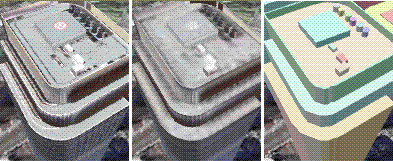Available with 3D Analyst license.
Multipatch features are three-dimensional objects that are usually used to represent solid objects, such as pipes, buildings, and airplanes. Multipatches can also be used to represent abstract volumes, such as a threat dome around a 3D location.
Some multipatch features include texture information for each displayed face of their geometry, which helps create photo-realism for a 3D view. Textures are particularly common on 3D buildings. A textured multipatch feature is effectively symbolizing itself and usually does not need further symbology. Textures are often very memory intensive and must be managed carefully. Layers that contain high-resolution textured objects can be configured to reduce their load on the display environment by downscaling the texture resolution and using texture compression within the graphics card. See Cache management in ArcGlobe for more details on assigning memory for multipatch geometry and textures.
In some cases, you may need to hide textures completely and display the multipatch geometries using simple symbology instead. For example, you may want to display classifications within a multipatch feature class. To do this, you can disable the textures and use simple symbology.
For multipatch features that do not have textures or have disabled textures, you can use polygon fill symbols to color the object. As with all other feature types, attributes can be used to differentiate between features. A fill color is applied to each multipatch feature as a single unit. This means, for example, that a single multipatch house feature cannot have its roof symbolized separately from its walls—there would have to be separate features for the roof and the body of the house.

The multipatch symbology options are shown in the above screen shots, with multipatch features rendered using full-resolution textures (left), downscaled textures (center), and disabled textures (right). The variety of colors used to render the building with disabled textures implies that many multipatch features are being used to represent this single structure.
Learn more about textured 3D objects, how to take advantage of your graphics card hardware to compress textures, and information about reducing texture resolution on multipatches.